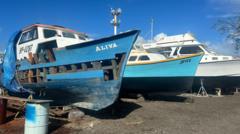The aftermath of Hurricane Beryl, which struck Barbados in July, has left the fishing community grappling with significant losses. The temporary boatyard in Bridgetown, where many fishing vessels stand mangled and cracked, serves as a visual testament to the devastation caused by the storm. Approximately 75% of the island's active fishing fleet suffered damage, with 88 boats completely destroyed.
One of the affected fishermen, Charles Carter, shared his experience: "It's been real bad, I can tell you. I had to change both sides of the hull, up to the waterline." Carter's restoration efforts have been costly and time-consuming, severely impacting his ability to earn a living from fishing. "The fishing industry is mash up," lamented Captain Euride, another local fisherman.
However, six months post-storm, there are signs of hope. On a recent warm Saturday, several repaired vessels, including Carter's boat named Joyce, were lifted back into the ocean with assistance from a crane and government support. Despite this positive step, fishermen remain wary, as climate change leads to increasingly severe and frequent storms—the recent Hurricane Beryl being the earliest-forming Category 5 hurricane ever recorded.
The islands are witnessing negative shifts in marine conditions, as confirmed by Dr. Shelly Ann Cox, Barbados’ Chief Fisheries Officer. Fishermen are reporting unexpected challenges, including higher sea swells and difficulties in catching flying fish, a staple of the Barbadian diet and culture. The Oistins Fish Market reflects this uncertainty, with many stalls remaining closed and supplies dwindling.
Cornelius Carrington, a fish vendor, echoed similar sentiments. "Right now, everything has changed... the whole pattern has changed," he indicated, pointing to the lasting effects of climate change not only on fishing but also on tourism, as restaurants struggle to meet fish demand.
In response to these challenges, local initiatives have emerged, including education programs for young islanders. The Caribbean Youth Environmental Network (CYEN) engaged students at Harrison College, where 17-year-old Isabella Fredricks expressed disillusionment over the island's minimal carbon footprint not being enough to combat larger polluters. Conversely, classmate Tenusha Ramsham maintained a hopeful outlook on innovation as a driver for change.
Prime Minister Mia Mottley has stepped up as an advocate for urgent climate action, emphasizing the existential threat rising sea levels pose to Barbados and similar nations. As fishermen recount their experiences, they reflect on the transformations occurring around them. Steven Bourne, having lost two boats to Hurricane Beryl, highlighted changing beach landscapes and climate realities.
As Home Affairs Minister Wilfred Abrahams noted, the frequency and intensity of hurricanes pose serious challenges for disaster management. The past wisdom of hurricane preparedness has become obsolete in a rapidly changing climate. Despite these challenges, Bourne and his fellow islanders remain tethered to their homeland. "Being afraid... don't make no sense. Because there's nowhere for we to go. We love this rock. And we will always be on this rock," Bourne concluded, emphasizing their commitment to the island amid adversity.
One of the affected fishermen, Charles Carter, shared his experience: "It's been real bad, I can tell you. I had to change both sides of the hull, up to the waterline." Carter's restoration efforts have been costly and time-consuming, severely impacting his ability to earn a living from fishing. "The fishing industry is mash up," lamented Captain Euride, another local fisherman.
However, six months post-storm, there are signs of hope. On a recent warm Saturday, several repaired vessels, including Carter's boat named Joyce, were lifted back into the ocean with assistance from a crane and government support. Despite this positive step, fishermen remain wary, as climate change leads to increasingly severe and frequent storms—the recent Hurricane Beryl being the earliest-forming Category 5 hurricane ever recorded.
The islands are witnessing negative shifts in marine conditions, as confirmed by Dr. Shelly Ann Cox, Barbados’ Chief Fisheries Officer. Fishermen are reporting unexpected challenges, including higher sea swells and difficulties in catching flying fish, a staple of the Barbadian diet and culture. The Oistins Fish Market reflects this uncertainty, with many stalls remaining closed and supplies dwindling.
Cornelius Carrington, a fish vendor, echoed similar sentiments. "Right now, everything has changed... the whole pattern has changed," he indicated, pointing to the lasting effects of climate change not only on fishing but also on tourism, as restaurants struggle to meet fish demand.
In response to these challenges, local initiatives have emerged, including education programs for young islanders. The Caribbean Youth Environmental Network (CYEN) engaged students at Harrison College, where 17-year-old Isabella Fredricks expressed disillusionment over the island's minimal carbon footprint not being enough to combat larger polluters. Conversely, classmate Tenusha Ramsham maintained a hopeful outlook on innovation as a driver for change.
Prime Minister Mia Mottley has stepped up as an advocate for urgent climate action, emphasizing the existential threat rising sea levels pose to Barbados and similar nations. As fishermen recount their experiences, they reflect on the transformations occurring around them. Steven Bourne, having lost two boats to Hurricane Beryl, highlighted changing beach landscapes and climate realities.
As Home Affairs Minister Wilfred Abrahams noted, the frequency and intensity of hurricanes pose serious challenges for disaster management. The past wisdom of hurricane preparedness has become obsolete in a rapidly changing climate. Despite these challenges, Bourne and his fellow islanders remain tethered to their homeland. "Being afraid... don't make no sense. Because there's nowhere for we to go. We love this rock. And we will always be on this rock," Bourne concluded, emphasizing their commitment to the island amid adversity.




















